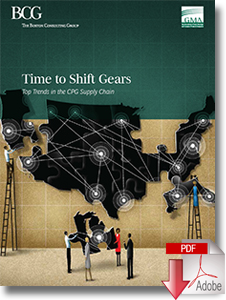Transportation, Network Redesign Top Priorities for Consumer Packaged Goods Supply Chain Leaders

Many hard-won supply-chain gains are being neutralized by external challenges; a new GMA/BCG report reveals six top supply-chain trends and how some consumer packaged goods companies are surmounting the obstacles.
A fast-changing, increasingly complex environment is posing daunting challenges for supply chain leaders at consumer packaged goods (CPG) companies.
According to a new report by The Boston Consulting Group (BCG) and the Grocery Manufacturers Association (GMA), their most pressing concerns today are transportation and network redesign - priorities that just two years ago barely registered on their radar..
The report - Time to Shift Gears: Top Trends in the CPG Supply Chain - identifies the six top trends that emerged from the 2015 GMA/BCG Supply Chain Benchmarking Study.
The study, the fifth in GMA’s benchmarking series on manufacturers’ outbound supply-chain logistics, involved 40 U.S. businesses of leading CPG companies.
Transportation emerged as the top concern of 83 percent of supply chain leaders this year, a marked increase from the 2013 study, when it didn’t receive a single mention. Two years ago, as in previous years, fuel price volatility was the major worry regarding transportation.
The new report shows that today the chief aggravations are more structural, with capacity constraints and escalating line-haul rates likely to keep transport costs high and rising for the foreseeable future.
Network redesign, the top worry of 72 percent of current respondents, was cited as a key priority by only 6 percent in the 2013 study.
Several developments have propelled network redesign toward the top of the agenda, including heightened postmerger-integration activity, higher transportation costs, the desire for more efficient and more carrier-friendly routes to market, and the recognition that fast-growing new channels present vastly different operational and shipping challenges.
“This new report shows that the supply chain leaders of CPG companies are dealing with both portfolio complexities, as companies introduce more new products and adapt to shorter product life cycles, and marketplace complexities, as they strive to serve fast-growing nontraditional channels such as convenience stores, dollar stores, and drugstores,” says Daniel Triot, a senior director of the Trading Partner Alliance, a joint leadership group of GMA and the Food Marketing Institute.
“The logistical challenges of managing expanded points of sale and changing product flows can affect company performance in service levels, costs, and inventory”
These challenges only exacerbate the squeeze that CPG companies are already feeling from the lack of significant growth that they’d hoped would result from the flood of new products and innovations.
Four other clear trends emerged from the 2015 survey:
- Freight costs are rising. Across all temperature modes, median freight costs rose 14 percent since the 2013 study, from $0.93 to $1.06 per case. For ambient shipments, they rose 11 percent (from $0.88 to $0.97 per case).
- Service is suffering. After peaking in 2010, service had fallen by 2012 and continued to decline at a faster rate through 2014. “In every key service measure, service has gotten progressively worse,” observes Peter Dawe, a BCG partner and a coauthor of the report. “In addition, the performance gap between the best and the worst performance widened.” The steepest drop occurred in the measure of on-time delivery known as requested arrival date, or RAD. “The RAD drop is an indication of just how tight capacity has become - and reflects growing challenges to meet retailer expectations,” Dawe says.
- Inventories are growing. Inventories expanded by 22 percent since the 2013 study. Roughly 70 percent of ambient CPG companies experienced increases. For ambient companies, median days of inventory on hand grew 20 percent (from 35 to 42 days) since the 2013 report. Temperature-controlled shippers had mixed results: 60 percent saw an increase in inventories, but the median actually declined.
- Forecasting accuracy has improved but hasn’t yielded the hoped-for benefits. The accuracy of CPG companies’ national forecasts increased from 73.6 percent to 75 percent since the 2013 study. But greater accuracy did little to hold down inventories or improve service.
As with forecasting accuracy, many of these results underscore the fragile dynamics in supply chain issues - another challenge for the industry. Says Alicia Pittman, a BCG partner and a coauthor of the report, “Even when inventory is in the right place at the right time, last-mile transportation issues might prevent CPG companies from getting product to retailers on time.”
Last-mile challenges include capacity constraints (from the shortage of drivers and lack of truckload volume) and congestion and delays, both en route and at delivery points.
Across the board, this has been a tough year for the CPG supply chain, with costs and inventory up and service levels down.
Although there appears to be little relief in sight, the challenges are not insurmountable. “There are lessons to be learned from the 16 percent of CPG companies that are breaking through to reduce costs and improve service,” notes Dawe.
“Traditional best practices are no longer sufficient. Today’s challenges require greater strategic partnership between the supply chain and the business as a whole. And when that happens, the supply chain can actually enable enterprise growth.”
Related: Why Consumer Packaged Goods Companies Need a Strategic Approach to Transportation

Article Topics
Boston Consulting Group News & Resources
Sustainability Ignored by 40% of Procurement Leaders Companies Targeting Supply Chain and Manufacturing for Cost Savings Supply chains are facing new pressures as companies seek cost savings The shift away from China is leading to India, notes Boston Consulting Group Report Exports from India Grow as Companies Shift Away from China BCG Report focuses on designing resilience into global supply chains Innovative Companies 2020: The Serial Innovation Imperative More Boston Consulting GroupLatest in Transportation
Baltimore Bridge Collapse: Impact on Freight Navigating Amazon Logistics’ Growth Shakes Up Shipping Industry in 2023 Nissan Channels Tesla With Its Latest Manufacturing Process Why are Diesel Prices Climbing Back Over $4 a Gallon? Luxury Car Brands in Limbo After Chinese Company Violates Labor Laws The Three Biggest Challenges Facing Shippers and Carriers in 2024 Supply Chain Stability Index: “Tremendous Improvement” in 2023 More Transportation













